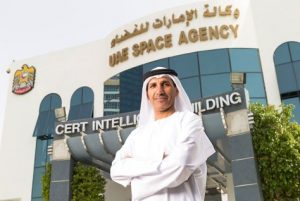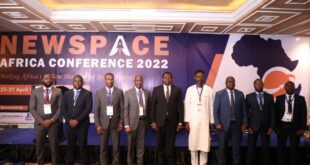
The UAE Space Agency has joined the Space Climate Observatory (SCO) initiative, along with other international space agencies, in an official ceremony attended by the French President Emmanuel Macron.
The initiative aims to establish a framework for cooperation between the participating countries, support the exchange of information and data on climate change, and expand the use of space technology in addressing the effects of climate change.
The official signing ceremony during which the UAE Space Agency officially joined the Space Climate Observatory was held on the sideline of the Paris Air Show, which is taking place at Le Bourget Airport in Paris, France, from 17 June to 23 June.
The joint declaration was signed by Dr. Ahmad bin Abdullah Humaid Belhoul Al Falasi, Minister of State for Higher Education and Advanced Skills, Chairman of the UAE Space Agency, in the presence of Emmanuel Macron, President of France, Dr. Eng. Mohammed Nasser Al Ahbabi, Director General of the UAE Space Agency, and a number of officials, engineers, and international representatives.
The declaration stipulates that members of the SCO share data from various sources including satellites to observe and monitor the effects of climate change. This will be achieved through the establishment of regional and local platforms that allow relevant parties to access the gathered data and information in order to examine the effects of climate change and develop potential solutions to its impacts.
Dr. Ahmad Belhoul Al Falasi said: “The UAE, represented by the UAE Space Agency, supports the establishment of the Space Climate Observatory, and looks forward to cooperating with all relevant parties to ensure its success. Space has an important role to play in addressing the challenge of climate change, which is negatively impacting our planet, infrastructure, and humanity.”
“International cooperation and the exchange of scientific knowledge and information are essential for finding effective solutions to environmental degradation and climate change. The UAE continues to play a vital role in this regard through its agreements with international organizations, and now its membership in the Space Climate Observatory, which aims to establish a framework for collaboration and cooperation between nations from around the world,” added Dr. Al Falasi.
Dr. Eng. Mohammed Nasser Al Ahbabi, Director General of the UAE Space Agency, said: “Since its foundation, the UAE Space Agency has been working with different international parties to support collaboration in various joint projects, which aim to serve humanity and improve our well-being. We look forward to continuing to enhance the contribution of the space sector in confronting the challenges facing humanity on environmental, economic, and social levels.”
“Several satellites developed and launched into space by the UAE include advanced remote sending and Earth observation capabilities, enabling them to monitor the impacts of climate change which include red tides and changes in soil composition and agricultural output. These satellites benefit national, regional, and international efforts to understand climate change and find effective solutions to the challenges it poses”, added Dr. Eng. Al Ahbabi.
In February, the UAE Space Agency participated in a meeting dedicated to launching the Space Climate Observatory initiative, which was held in the French capital Paris and attended by international space agencies. The meeting focused on the framework of the initiative and how to shape it so that it could provide decision-makers with the necessary information to take effective steps to limit the damaging impact of climate change.
The Observatory is an initiative of the French National Centre for Space Studies (CNES), and it aims to combine satellite and field data with scientific research to model and track climate change and its impacts at global-to-local scales. It is also working to establish indicators and decision-support tools in a coordinated and cross-disciplinary fashion, including with social and economic sciences, to enhance our collective ability to mitigate the impacts of climate change.
//WAM//





